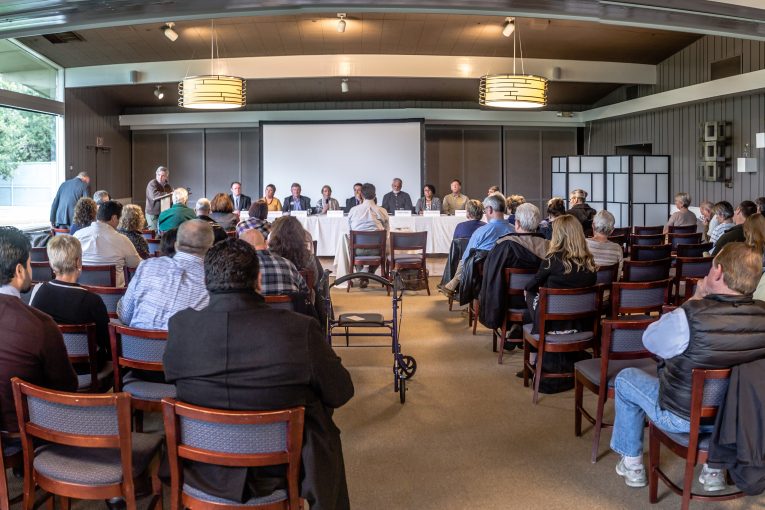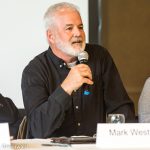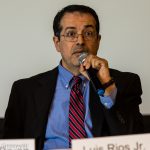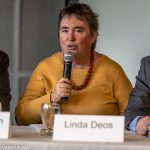

Eight of the nine Davis City Council candidates met on Wednesday at the ChamberPac Forum with Colin Walsh standing in for the ninth candidate, Ezra Beeman.
The first three rounds of questions had each candidate asked a separate question and given 90 seconds to respond.
 Larry Guenther – Explain three things you would like to do if you were elected to council.
Larry Guenther – Explain three things you would like to do if you were elected to council.
Reducing city cost, increasing city revenue. On the downtown plan advisory committee – I think downtown is a good analogy to the rest of the city. We got good bones, there’s a lot of good stuff there, but we need to kind of ramp it up. We’ve empty store fronts, we’ve got the parking problem, the homeless problem. The city has been working to address some of those issues. We need to keep going. We need to deal with the problems that are keeping us from succeeding as a city.
Three issues – increasing revenues, decreasing expenses and sunshine and happiness.
 Eric Gudz – How would you help the housing crisis in Davis?
Eric Gudz – How would you help the housing crisis in Davis?
A couple of things that I would do right away with regard to our affordable housing crisis in Davis. First and foremost, as someone who has been a scholar of land use and transportation policy, I  would hope to ensure that both our Downtown Core Area Specific Plan as well as our General Plan, that we start to pave the way toward having a fundamental examination of the way in which we’re arranging land within our town. Some of our land use, some of our zoning, a lot of those pieces and elements of our plans are very much outdated, shall we say. They don’t necessarily reflect the realities of today, they don’t necessarily reflect the realities of the regional importance of this community – of Davis, of UC Davis and what we contribute to the greater economic region within Sacramento. I think first and foremost we have to take a very hard look at the way we’re arranging and organizing our land within the town. Secondarily, I think there’s a lot of work we can do to try to incentivize particular kinds of development within the city of Davis. There’s things we can do to try to work with our project proponents and developers to incentivize the kinds of housing and kinds of affordability that we need – accessory dwelling units, micro-homes, flats, one-bedroom apartments, things like that, things that will enable those who are struggling to make the margins to be able to strive and thrive in Davis, to be able to get their foot on the ground.
would hope to ensure that both our Downtown Core Area Specific Plan as well as our General Plan, that we start to pave the way toward having a fundamental examination of the way in which we’re arranging land within our town. Some of our land use, some of our zoning, a lot of those pieces and elements of our plans are very much outdated, shall we say. They don’t necessarily reflect the realities of today, they don’t necessarily reflect the realities of the regional importance of this community – of Davis, of UC Davis and what we contribute to the greater economic region within Sacramento. I think first and foremost we have to take a very hard look at the way we’re arranging and organizing our land within the town. Secondarily, I think there’s a lot of work we can do to try to incentivize particular kinds of development within the city of Davis. There’s things we can do to try to work with our project proponents and developers to incentivize the kinds of housing and kinds of affordability that we need – accessory dwelling units, micro-homes, flats, one-bedroom apartments, things like that, things that will enable those who are struggling to make the margins to be able to strive and thrive in Davis, to be able to get their foot on the ground.
 Gloria – You talked about the challenges about owning a small business, what can you do to help overcome the challenges for small business?
Gloria – You talked about the challenges about owning a small business, what can you do to help overcome the challenges for small business?
The challenges that I see for small business – for mine and for others – is trying to stay above the fees that are imposed on small businesses. Trying to find affordable rent in town is really tough. That’s because our housing prices are so high in town that it spills over to the rents that the businesses are paying. I also feel that there is a huge amount of turnover – there’s huge competition in town for businesses. I know that the city has an innovation officer. I really feel that we can use our innovation officer to do more outreach. Could do more polling of what types of businesses would do well in town. So when the business comes in they can have some sort of counseling for whether or not they would be viable – I think we can support businesses that are having a tough time in maybe the place that they’re located.
 Mark West – One of the concerns about growth is increased traffic, what suggestions do you have to help mitigate those issues?
Mark West – One of the concerns about growth is increased traffic, what suggestions do you have to help mitigate those issues?
What things can we do to mitigate more traffic impacts of more people being in town, more businesses being in town, there’s a couple of things that we need to consider. Number one is a mindset about traffic. If you’re running a business, especially if you have a retail business, you don’t want traffic to be flowing by your business at 50 miles per hour, you want it to slow down. Traffic downtown is actually a good thing because it means people are driving slower, they’re getting out of their cars and walking. You’ve got to think about it in a little bit different way – it’s not level of service, it’s what are we going to do, why are the cars driving around. In the downtown area, traffic is because you don’t have a good way of managing our parking yet. That’s what the paid parking is for, is to help manage the parking inventory that we have so the people aren’t driving around in circles looking for a place to park all the time. If we spread our businesses around a bit more rather than having them centered in tight areas – we would be able to spread the traffic and the impacts of all the extra people around town. The same is true for the high density housing that I advocate for the houses and condominiums, if we move them into different parts of the community we share that burden throughout the entire community.
 Luis Rios – What’s your vision for what would be smart growth in Davis?
Luis Rios – What’s your vision for what would be smart growth in Davis?
I was born in Davis, I always knew when I wanted raise a family I would come back and live here and make sure my kids go to public schools – which they do. I’m raising my kids here because I like the small town character, I like the small town environment that Davis offers. I think about the parents I have met at the city parks when I take my preschoolers – I talk to a lot of parents at all the parks, new families, young families, with the kids, with children, those are the new generations and pretty much I think I have the pulse of how they think and where they live and what they’re seeking for the future of Davis. They’re here, they’re invested and living in this community, and we want housing, we want smart growth housing. We want to convene with developers, realtors, business people, yourselves and come to some sort of consensus and say look, we have families here, homes may be somewhat above the market – we need to really negotiate that if we really want to think about the next ten years, twenty years, we really have to focus on families, small town activities, community engagement for students, and then we’ll take it to the next level.
 Mary Jo Bryan – Are things better now than they used to be and what’s the direction, are they getting better or worse?
Mary Jo Bryan – Are things better now than they used to be and what’s the direction, are they getting better or worse?
I wouldn’t still be here if it were getting worse. I downsized, I sold my house on 12th Street and I moved over to Rancho Yolo. Did I ever think I would be living in a mobile home? No I didn’t, but I’m happy that I’m there, and I found a place that was affordable and I could still enjoy everything about Davis. I could walk downtown, I could bike around. I can say that one of the problems is traffic a little bit. We were a bike city, I think in some ways, we’re losing that little bit because of traffic and because of, well for one thing, our streets and bike paths need to be redone – so that we’re safer on our bicycles. I can say that I think the shopping needs to be improved, for people like me. I was having coffee with a college student a couple of weeks ago, and she said to me, I don’t see anybody like you downtown walking around. I said that’s because we come down for the shows, the movies and we come down for dinner. But we really have a hard time to find places to really shop in downtown Davis. I love downtown, I love summer nights, I love being out downtown, I love the business… It’s fun, it’s just fun to be downtown and it’s fun to be in Davis. No, I like Davis.
 Dan Carson – What motivated you to run for city council and what are you hoping to accomplish?
Dan Carson – What motivated you to run for city council and what are you hoping to accomplish?
The core reason I’m running is because of the city’s $8 million a year funding gap between the money that would come in on the natural and what we need to pay for the compensation for our city staff and deal with the decline in our infrastructure – the potholes, the parks, the wear and tear on our greenbelts. The approach I think I can bring is a mix of things – restraint in the increases in city compensation cost is an important part of that. I think we have as a city, land and assets that we collectively own but we should be getting a return on our money, a return on our investment. And then economic development is a critical way to generate those non-tax revenues that if we’re successful we can take the pressure off of us as taxpayers. There’s a parcel tax package on the ballot, that will provide $3 million of that $8 million solution. If we don’t go down the path and write a balanced and comprehensive solution, that encompasses some of these other strategies, they will be back with additional parcel tax measures or other kinds of tax strategies. I want to try to put it all together with a comprehensive solution.
 Linda Deos – We have a number of empty store fronts some of which are failed businesses. What do you think we can do to reduce the number of downtown businesses closing?
Linda Deos – We have a number of empty store fronts some of which are failed businesses. What do you think we can do to reduce the number of downtown businesses closing?
That is going to be our challenge going forward because we are facing the fact that we have high rents downtown and parking may be a challenge given how one looks at it – if you’re on a bike, it’s not that challenging. And if you’re walking, it’s okay perhaps not, but for parking it can be. In talking to business owners downtown, and my own experience talking with other attorneys, who are unable to find office space downtown, for their clients to come in and see them at, it comes down to finding the type of business that is going to make it here and that is going to be working with Diane Parro, that is going to be working with the Chamber with Downtown Davis to see what works here. We’ve made a decision as a community of not wanting to bring in more big box, not bringing in the big chains, but at the same time it’s those outfits that can afford our rent and can move forward. I’m not a coffee drinker, but obviously a lot of people are, because they are sure doing well downtown – we are going to have to talk to one another about that and see what the businesses are going to be that will be successful. There’s a segment of the population that is being well served by our downtown businesses, and I get it, because they’re shopping, but we need to find a way to diversify that, to bring more of us downtown on a more consistent basis.
 Ezra Beeman represented by Colin Walsh – We talked about growth and Ezra clearly has some positions on growth. Share with me your thoughts about the growth projects that are clearly under discussion in general in Davis.
Ezra Beeman represented by Colin Walsh – We talked about growth and Ezra clearly has some positions on growth. Share with me your thoughts about the growth projects that are clearly under discussion in general in Davis.
(Colin reading for Ezra who wrote these answers) I’m a strong supporter of Measure R, the citizens’ right to vote. There are two projects before the city that may go to a Measure R vote in the near future. I’m opposed to the Nishi project. It has not been thoroughly vetted financially and may actually cost the city quite a bit of money. Then there’s the air quality issue of course. If you look to the West Davis Active Adult, this may actually be a project that has gone through a better process. I think market research is pretty important to ensure we are focused on growing the right things for the right reasons. I have set out, in my response, how I think we can better capture business that is currently going outside of Davis due to the lack of supply and how we can grow business by leveraging our advantages with UCD and sustainability. Finally I see national leadership in the sustainability of our housing, energy, transport, waste and water systems as key drivers of community benefits and a sustainable high value growth.
—David M. Greenwald reporting


During the forum, Mark West made a statement that I did not understand and time did not permit follow up. In thinking about this more, I wanted to ask the Vanguard group including business owners their thoughts. Please bear in mind I have no experience with business ownership.
His statements paraphrased were:
1. We must nurture businesses. 2. The city must not pick winners and losers.
My questions for Mark and Vanguard readers:
1. What does it mean to “nurture” a business ? Whose job is it to do so ? The City? The existing business community ?
2. What does it mean to pick winners and losers ? Do we “nurture” all businesses, or only some?
3. What processes are already in existence to nurture businesses in the city ? In the business community ?
4. Do “we” ( either city or existing business community) provide financial assistance, mentoring, variances from onerous rules and regulations?
Colin Walsh sits in for Ezra Beeman. I could’ve sworn a few weeks ago I was rebuked for implying that Colin Walsh pulls Ezra’s strings. Now we have proof of it.
Why in the world did the chamber permit this to occur? Were the other candidates consulted?
COLIN WALSH IS SUING THE CITY OF DAVIS.
That was my knee-jerk reaction as well. But then, upon reflection, it occurs to me that when we vote for public officials, we are voting as part of their constituency. Beeman couldn’t make it, so he sent his trusted political supporter who would represent him. If you think Colin Walsh is a bad actor, then don’t vote for Beeman. It’s not personal.
No you don’t.
Craig
“Now we have proof of it.”
I fail to see how Ezra being out of town at the time of the forum proves anything at all except his inability to be two places at once, which was indeed confirmed.
Well you’ve ignored another variable here – his choice of stand-in’s. Also what exactly is his priority here – council or something else? Is that what we look forward to while he is on council – stand in councilmembers? Oh yeah, that’s don’t work. Why does it work here?
It is a matter of priorities. And what is his priority? I understand that he’s been to one council meeting, period. And then there is his choice of stand in, a man suing the city.
So, Craig, would you be willing to share who you support?
You seem keen on ‘relationships’… I say this having no one in the field that I feel I can positively support… today…
If Ezra did not intend, by his choice of surrogate, to express his support for Colin Walsh’s lawsuit, then he should probably make that very clear. Nothing wrong with Colin being involved in the campaign. But as a stand-in? That sends a clear signal, and I assume it was intentional.
As to whether Colin is his campaign chair, I don’t see any evidence of that. I have no idea who is anyone’s campaign chair. Maybe we need a list.
Don’t disagree, per se, but that can be ‘gamed’, too… not sure it would be informative, and might be deceptive… just saying…
At this point, am still leaning toward the “none of the above” option, but think only Nevada has that on their ballot… I see two or three “tweeners”, that I could vote for as the “lesser of evils”… just saying…
And, however imperfect, there are the public records as to campaign contributers, etc. that have to be filed with the City Clerk…